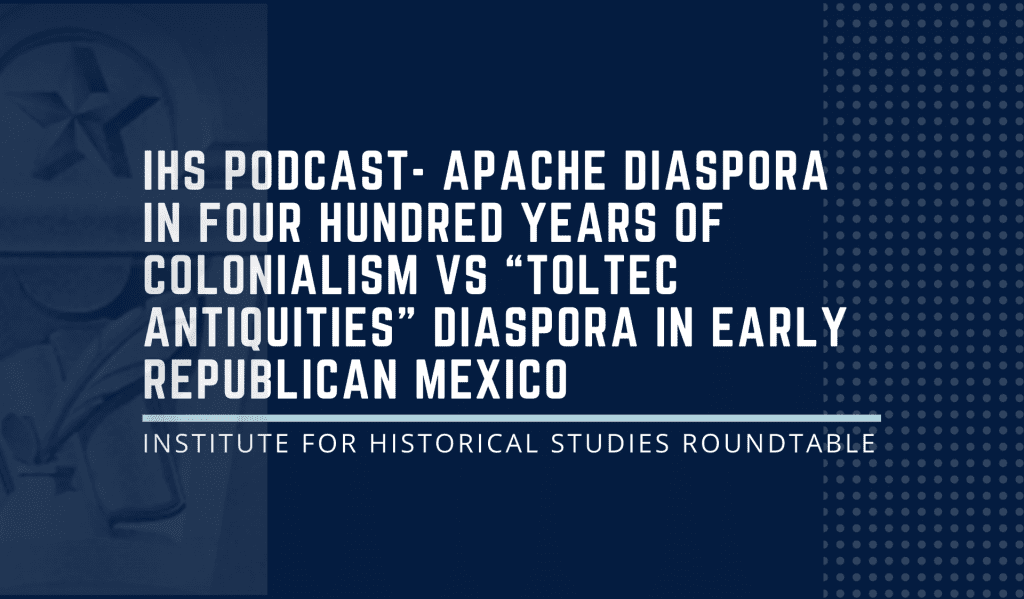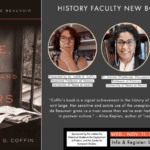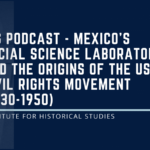
IHS podcasts are a new podcast series initiated by the Institute for Historical Studies’ Director, Dr Jorge Cañizares-Esguerra. They are paired with weekly workshops and are designed to foster discussion between graduate students and distinguished scholars in the field. Along with graduate students and guests, each episode features Dr Cañizares-Esguerra and Ashley Garcia, a PhD Candidate in History at UT Austin.
This podcast previews a roundtable discussion that will be held on Monday, September 20 at 12 pm. More information on the roundtable can be found here. It features Dr. Miruna Achim (Universidad Autonoma Metropolitana-Cuajimalpa Mexico City), Dr. Paul Conrad (UT Arlington) and co-hosts Jorge Cañizares-Esguerra and Sheena Cox (UT Austin).
Introduction
Our two guests are the authors of two recently important books. Paul Conrad is the author of The Apache Diaspora Four Centuries of Displacement and Survival (2021) and Miruna Achim of From Idols to Antiquity: Forging the Nation Museum of Mexico (2017). The two book appear unrelated, but they are connected in ways that are relevant to the interests of Sheena Cox, whose essay we will be discussing on Monday, Sept. 20 at noon.
Sheena explores Iturbide’s imperial new practices of indigenous diplomacy that relied on Tejano-Comanche exiles. She also explores the discourse “civilization” that forced casta leaders like the pardo Vicente Guerrero to consider indigenous nomadic peoples as potential citizens of the polity only if civilized. Sheena explores the Imperial new diplomacy in borderlands as a project of local exiled Tejanos whose families were Comanche in Natchitoches. The whole of colonial wars in the borderlands, from Nuño de Guzman‘s “Chichimec” Wars to the Battle of Medina, had this peculiar mestizo-indigenous characters at its very center.
Conrad explore the Apache Diaspora under three different polities: the Spanish Monarchy, the Mexican Republic, and the US Empire of settler colonialism. The changing Apache Diaspora yield different human experiences as these polities engaged with the Apache differently over time.
Conrad offers a history of monarchy, nation and empire from the perspective of the Apache, radically decentering chronologies, geographies, narrative of institutional and political continuity and discontinuity between Mexico and the USA. Conrad begins at the micro local level (the palace of the governors of New Mexico that operated largely using Apache captives) only to expand gradually the Apache Diaspora into larger geographies (New Mexico as whole; the mining districts of Coahuila, Durango and Central Mexico; Mexico City; the Caribbean island as prisons, and the US continental empire of scattered reservations). In Conrad’s hands the Apaches de paz, settling along the presidios of Texas, Coahuila, New Mexico, Nueva Vizcaya in exchange for commodities, become the prefiguration of the US reservation.
Conrad’s Spanish Monarchy, like Sheena’s First Mexican Empire of Iturbide, is an amalgamation of peoples, including the Pueblo, Tlaxcalan settlers, and mestizos who accompanied Oñate and created New Mexico. These were the peoples who raided Navajos and Apaches. It was also the raids of the Wichita and Comanche that created the Apache relocation to Texas and the creation of multiple Apache identities around presidios and diasporas. Is Spanish a misnomer?
Achim’s Mexican republic is partly a creature of continuities that inherited the Spanish monarchy’s practices, institutions, collections, and personnel. But is also a “failed” state, utterly incapable of disciplining anyone into supplying the National Museum of Mexico with collections. Neither the governors in Chiapas and Yucatan nor local communities (Palenque) acknowledged the authority of the Museum directors and relinquished objects to the Museum collections. European and US traveler collectors paid no attention to the laws the Museum’s directors had the Mexican Congress pass to protect “antiquities” either. Neither legal restrictions nor the institutionalization of the museum could prevent the massive “diaspora” of collections and manuscripts that began with Iturbide’s Empire. It took the creation of a form of national populism under Benito Juarez for the central state to finally come of age and stop the plunder.
Yet ideas mattered. Achim explores the ways the various directors of the museum did engage with the collections in meaningful ways, particularly through the publications of cluttered objects in small spaces via their publication in newspapers (as museums of paper: museos de papel). Achim also honors the intellectual prowess of one of the Museum directors: José Fernando Ramirez whose insights have remained very much silenced and forgotten, eclipsed by scholarship on the likes of Humboldt and William Prescott.
Achim demonstrates Ramirez’s precociousness and depth and his radical new ways of interpreting ‘Mexican” antiquities via their contextualization through colonial and precolonial documents and their Nahua names. For Ramirez the Museum was about collecting an archive of paper and documentation.
Achim describes a republic that actively manufactured a sense of the past that had room for stuff birds but not for three centuries of the colonial past. How a republic created a sense of history that saw the deep antiquity of Mexico as the only aspect of its past worth remembering? The manufacturing of ignorance of the colonial past is an aspect of her work that is worth exploring in the future.
~ Jorge Cañizares-Esguerra
Guests
Dr. Miruna Achim is an Associate Professor of Humanities at the Universidad Autonoma Metropolitana-Cuajimalpa Mexico City. Her research centers on the material cultures of science and technology, the history of medicine, and the history of antiquarianism and collection building in nineteenth-century Mexico. Her more recent publications include From Idols to Antiquity: Forging the National Museum of Mexico (Nebraska UP, 2017), Museum Matters: Making and Unmaking Mexico’s National Collections (edited with Susan Deans-Smith and Sandra Rozental, University of Arizona Press, 2021); Piedra, papel y tijera. Instrumentos en las ciencias en México (edited with Laura Cházaro and Nuria Valverde, UAM, 2018); and Museos al detalle: colecciones, antigüedades e historia natural (edited with Irina Podgorny, Prohistoria, 2014). Presently, she is researching the post-conquest lives of Mesoamerican jades between the sixteenth through twenty-first centuries, a project which brings together studies on Mesoamerican cosmogonies and material cultures, European pharmacopeias, curiosity cabinets, and commercial routes between the New World, China, and New Zealand.
Dr. Paul Conrad is an Associate Professor at the University of Texas at Arlington where he teaches courses on Native American history and literature. His research focuses on Indigenous peoples’ confrontations with the colonialism in North America across the long durée, with particular interest in questions of captivity, forced migration, and enslavement. This research has been supported by grants and fellowships from organizations such as the McNeil Center for Early American Studies, the Phillips Fund for Native American research, and the Clements Center for Southwest Studies. His book, The Apache Diaspora: Four Centuries of Displacement and Survival, was recently published by the University of Pennsylvania Press.
Sheena Cox is a Borderlands Ph.D. Candidate at The University of Texas at Austin. Her research is focused on the Liberal Enlightenment in Texas and its impact on Indigenous relations with Tejanos and Mexicans from 1810-1839. In addition to her dissertation research, Sheena is also dedicated to public history and historic preservation through projects with the Bullock Texas State History Museum and the Texas Historical Commission. From 2019-2021, Sheena worked as the coordinator for TSHA’s annual meeting program. She has served as a graduate research assistant for the Handbook of Texas, and as an assistant editor for the Handbook of Texas Women and Handbook of Dallas Fort-Worth Handbook projects.
Hosts
Jorge Cañizares-Esguerra is Alice Drysdale Sheffield Professor of History at the University of Texas at Austin and the Director of the Institute for Historical Studies.
Ashley Garcia is a PhD candidate at the University of Texas at Austin. Her research includes 19th century political history, American communitarianism, and American political thought. Her dissertation, “An American Socialism: The Associationist Movement and Nineteenth Century Political Culture,” explores America’s most popular utopian socialist program: the Associationist movement of the 19th-century. Ashley has also completed a Portfolio in Museum Studies as her secondary PhD field.
The views and opinions expressed in this article or video are those of the individual author(s) or presenter(s) and do not necessarily reflect the policy or views of the editors at Not Even Past, the UT Department of History, the University of Texas at Austin, or the UT System Board of Regents. Not Even Past is an online public history magazine rather than a peer-reviewed academic journal. While we make efforts to ensure that factual information in articles was obtained from reliable sources, Not Even Past is not responsible for any errors or omissions.



